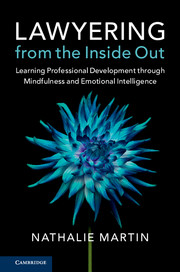 Lawyering from the Inside Out
Lawyering from the Inside Out Book contents
- Frontmatter
- Dedication
- Contents
- List of Figures
- List of Contributors
- Foreword
- Acknowledgments
- Introduction
- PART I NURTURING YOUR BEST SELF
- PART II YOU AND OTHERS AROUND YOU
- 9 Introduction to Emotional Intelligence: Theory and Practice
- 10 Advanced Emotional Intelligence Skills
- 11 Emotional Intelligence on the Page: The Writer's Life
- 12 Giving and Receiving Feedback
- 13 Empathy
- 14 Cross-Cultural Lawyering
- 15 Making Mindful, Client-Centered Decisions
- PART III YOU AND SOCIETY: FINDING GREATER PURPOSE
- Index
11 - Emotional Intelligence on the Page: The Writer's Life
from PART II - YOU AND OTHERS AROUND YOU
Published online by Cambridge University Press: 18 May 2018
- Frontmatter
- Dedication
- Contents
- List of Figures
- List of Contributors
- Foreword
- Acknowledgments
- Introduction
- PART I NURTURING YOUR BEST SELF
- PART II YOU AND OTHERS AROUND YOU
- 9 Introduction to Emotional Intelligence: Theory and Practice
- 10 Advanced Emotional Intelligence Skills
- 11 Emotional Intelligence on the Page: The Writer's Life
- 12 Giving and Receiving Feedback
- 13 Empathy
- 14 Cross-Cultural Lawyering
- 15 Making Mindful, Client-Centered Decisions
- PART III YOU AND SOCIETY: FINDING GREATER PURPOSE
- Index
Summary
If you can find a lawyer job that does not consist primarily of writing, that is a rare job indeed. You are also missing out on one of the best things our profession has to offer. Just as children who read regularly in their formative years live easier lives, people who write well have a magic ticket in legal life.
Words are a lawyer's trade. Putting words on paper is a signature lawyering skill and likely our most meaningful societal contribution. Whether drafting or editing a bill for state or federal legislation, a letter for a friend or family member, or a complex buy/sell contract, lawyers must have a way with words. Lawyers also use words to prepare for arguments, negotiations, and meetings. We use words all day every day, many of them written. Lawyers deal in gray areas and difficult situations, making the particular words important. Intentional word choice is often the difference between winning and losing, succeeding and failing. This chapter focuses on how to write more easily, more effectively, and with greater emotional intelligence. For many lawyers, writing things down is a way of thinking through legal problems. For this reason, we try to encourage you to write as much as possible in law school, in as many contexts as possible. As one clerk of US Supreme Court Justice Warren Burger said:
For the Chief Justice, writing was not just a means of communicating. It was a necessary tool for thinking through the most difficult problems. For him, tough analytical thought and precise legal reasoning were not the product of oral disputation. Rather, the fundamental intellectual process of lawyering and judging occurred when the validity of an initial hunch or intuitive flash was tested by pen meeting legal pad. As the pen met paper, private musings and dialogue were transformed into solid analysis or discarded as useless as he searched for the appropriate outline of the opinion, the “best” phrase, the “right” words to convey a thought. After reading briefs, studying cases, and listening to oral arguments, he would often say “Let's see how this writes out.”
- Type
- Chapter
- Information
- Lawyering from the Inside OutLearning Professional Development through Mindfulness and Emotional Intelligence, pp. 165 - 181Publisher: Cambridge University PressPrint publication year: 2018


